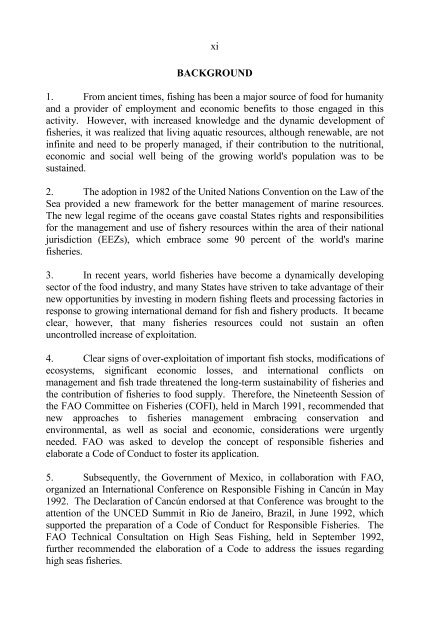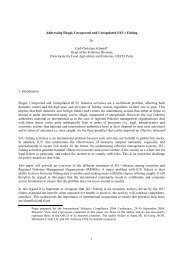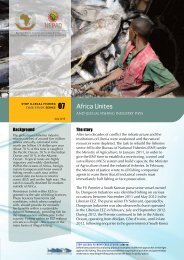xiBACKGROUND1. From ancient times, fishing has been a major source <strong>of</strong> food for humanityand a provider <strong>of</strong> employment and economic benefits to those engaged in thisactivity. However, with increased knowledge and the dynamic development <strong>of</strong>fisheries, it was realized that living aquatic resources, although renewable, are notinfinite and need to be properly managed, if their contribution to the nutritional,economic and social well being <strong>of</strong> the growing world's population was to besustained.2. The adoption in 1982 <strong>of</strong> the United Nations Convention on the Law <strong>of</strong> theSea provided a new framework for the better management <strong>of</strong> marine resources.The new legal regime <strong>of</strong> the oceans gave coastal States rights and responsibilitiesfor the management and use <strong>of</strong> fishery resources within the area <strong>of</strong> their nationaljurisdiction (EEZs), which embrace some 90 percent <strong>of</strong> the world's marinefisheries.3. In recent years, world fisheries have become a dynamically developingsector <strong>of</strong> the food industry, and many States have striven to take advantage <strong>of</strong> theirnew opportunities by investing in modern fishing fleets and processing factories inresponse to growing international demand for fish and fishery products. It becameclear, however, that many fisheries resources could not sustain an <strong>of</strong>tenuncontrolled increase <strong>of</strong> exploitation.4. Clear signs <strong>of</strong> over-exploitation <strong>of</strong> important fish stocks, modifications <strong>of</strong>ecosystems, significant economic losses, and international conflicts onmanagement and fish trade threatened the long-term sustainability <strong>of</strong> fisheries andthe contribution <strong>of</strong> fisheries to food supply. Therefore, the Nineteenth Session <strong>of</strong>the FAO Committee on Fisheries (COFI), held in March 1991, recommended thatnew approaches to fisheries management embracing conservation andenvironmental, as well as social and economic, considerations were urgentlyneeded. FAO was asked to develop the concept <strong>of</strong> responsible fisheries andelaborate a Code <strong>of</strong> Conduct to foster its application.5. Subsequently, the Government <strong>of</strong> Mexico, in collaboration with FAO,organized an <strong>International</strong> Conference on Responsible Fishing in Cancún in May1992. The Declaration <strong>of</strong> Cancún endorsed at that Conference was brought to theattention <strong>of</strong> the UNCED Summit in Rio de Janeiro, Brazil, in June 1992, whichsupported the preparation <strong>of</strong> a Code <strong>of</strong> Conduct for Responsible Fisheries. TheFAO Technical Consultation on High Seas Fishing, held in September 1992,further recommended the elaboration <strong>of</strong> a Code to address the issues regardinghigh seas fisheries.
xii6. The One Hundred and Second Session <strong>of</strong> the FAO Council, held inNovember 1992, discussed the elaboration <strong>of</strong> the Code, recommending thatpriority be given to high seas issues and requested that proposals for the Code bepresented to the 1993 session <strong>of</strong> the Committee on Fisheries.7. The Twentieth Session <strong>of</strong> COFI, held in March 1993, examined ingeneral the proposed framework and content for such a Code, including theelaboration <strong>of</strong> guidelines, and endorsed a time frame for the further elaboration <strong>of</strong>the Code. It also requested FAO to prepare, on a "fast track" basis, as part <strong>of</strong> theCode, proposals to prevent reflagging <strong>of</strong> fishing vessels which affect conservationand management measures on the high seas. This resulted in the FAO Conference,at its Twenty-seventh Session in November 1993, adopting the Agreement toPromote Compliance with <strong>International</strong> Conservation and Management Measuresby Fishing Vessels on the High Seas, which, according to FAO ConferenceResolution 15/93, forms an integral part <strong>of</strong> the Code.8. The Code was formulated so as to be interpreted and applied inconformity with the relevant rules <strong>of</strong> international law, as reflected in the UnitedNations Convention on the Law <strong>of</strong> the Sea, 1982, as well as with the Agreementfor the <strong>Implementation</strong> <strong>of</strong> the Provisions <strong>of</strong> the United Nations Convention on theLaw <strong>of</strong> the Sea <strong>of</strong> 10 December 1982 Relating to the Conservation andManagement <strong>of</strong> Straddling Fish Stocks and Highly Migratory Fish Stocks, 1995,and in the light <strong>of</strong>, inter alia, the 1992 Declaration <strong>of</strong> Cancún and the 1992 RioDeclaration on Environment and Development, in particular Chapter 17 <strong>of</strong> Agenda21.9. The development <strong>of</strong> the Code was carried out by FAO in consultation andcollaboration with relevant United Nations Agencies and other internationalorganizations, including non-governmental organizations.10. The Code <strong>of</strong> Conduct consists <strong>of</strong> five introductory articles: Nature andScope; Objectives; Relationship with Other <strong>International</strong> Instruments;<strong>Implementation</strong>, Monitoring and Updating and Special Requirements <strong>of</strong>Developing Countries. These introductory articles are followed by an article onGeneral Principles, which precedes the six thematic articles on FisheriesManagement, Fishing Operations, Aquaculture Development, Integration <strong>of</strong>Fisheries into Coastal Area Management, Post-Harvest Practices and Trade, andFisheries Research. As already mentioned, the Agreement to Promote Compliancewith <strong>International</strong> Conservation and Management Measures by Fishing Vessels onthe High Seas forms an integral part <strong>of</strong> the Code.
- Page 4 and 5: iiiPREPARATION OF THIS DOCUMENTThe
- Page 6 and 7: vThe IPOA-IUU is voluntary. However
- Page 8 and 9: viii6.2 Examples of some port State
- Page 12 and 13: xiii11. The Code is voluntary. Howe
- Page 14 and 15: 1. INTERNATIONAL PLAN OF ACTION - I
- Page 16 and 17: 3Since the late 1990s, a number of
- Page 18 and 19: 5(1) conducted by national or forei
- Page 20 and 21: 7flag States, coastal States and Po
- Page 22 and 23: 9In light of this, the very first
- Page 24 and 25: 11the vessels rarely if ever visit
- Page 26 and 27: 13For example, Japan requires its n
- Page 28 and 29: 15IUU fishing on the high seas. 27
- Page 30 and 31: 17end all forms of government econo
- Page 32 and 33: 19developing States, 36 have introd
- Page 34 and 35: 21If the vessel is fishing on the h
- Page 36 and 37: 23registering a vessel that has a h
- Page 38 and 39: 25RFMOs have a role to play in ensu
- Page 40 and 41: 27FAO, in turn, will make available
- Page 42 and 43: 29species can be caught, what gear
- Page 44 and 45: 31Flag States are also encouraged t
- Page 46 and 47: 33cases, fishing vessels registered
- Page 48: 35light of this, paragraph 51 of th
- Page 51 and 52: 38transshipment at sea is prohibite
- Page 53 and 54: 40supported IUU fishing. For exampl
- Page 55 and 56: 42Japan prohibits port calls by tun
- Page 57 and 58: 44of a NAFO member, it must be insp
- Page 59 and 60: 46discussed in Section 7 of these g
- Page 61 and 62:
48products harvested through IUU fi
- Page 63 and 64:
50products. On the basis of that da
- Page 65 and 66:
52question, while the latter only c
- Page 67 and 68:
54States can also combat IUU fishin
- Page 69 and 70:
56RFMOs engage in IUU fishing. No s
- Page 71 and 72:
588.3 Possibilities for Further Act
- Page 73 and 74:
60resolutions calling on those memb
- Page 75 and 76:
62landings, port control, and inspe
- Page 77 and 78:
648.3.8 Actions in Response to Rema
- Page 79 and 80:
66As a result, IUU fishers often co
- Page 81 and 82:
68A number of other developed State
- Page 83 and 84:
702.4 Measures to control transport
- Page 85 and 86:
10.3 Suggested Format for Reports t
- Page 87 and 88:
74Flag States should closely contro
- Page 89 and 90:
76A coastal State should consider r
- Page 91 and 92:
78To assist States in implementing
- Page 93 and 94:
12. LITERATURE CITED80Agnew, D.J. 2
- Page 95 and 96:
82Greenpeace. 2001. Pirate Fishing:
- Page 97 and 98:
84II. NATURE AND SCOPE OF IUU FISHI
- Page 99 and 100:
86to the Conservation and Managemen
- Page 101 and 102:
National Legislation88Legislation16
- Page 103 and 104:
90National Plans of Action25. State
- Page 105 and 106:
9236.2 having taken into account al
- Page 107 and 108:
9446.3 the species, fishing gear au
- Page 109 and 110:
9651.2 cooperation and exchange of
- Page 111 and 112:
98general operating guidelines for
- Page 113 and 114:
100and should consider measures to
- Page 115 and 116:
10280.9 development of observer pro
- Page 117 and 118:
10486.3 the strengthening of region
- Page 119 and 120:
106Articles V, VI, and VII of the A
- Page 121 and 122:
1084.2 To the greatest extent pract
- Page 123 and 124:
110• Compliance with other aspect
- Page 125 and 126:
1126. Information regarding such si
- Page 127 and 128:
114Annex ACommon English Name Scien
- Page 129 and 130:
1164. Parties shall consider and ac
- Page 131 and 132:
118Committed to take steps, consist
- Page 133 and 134:
1209. An export-validated Dissostic
- Page 135:
122APPENDIX VIWEBSITES OF SELECTED
















